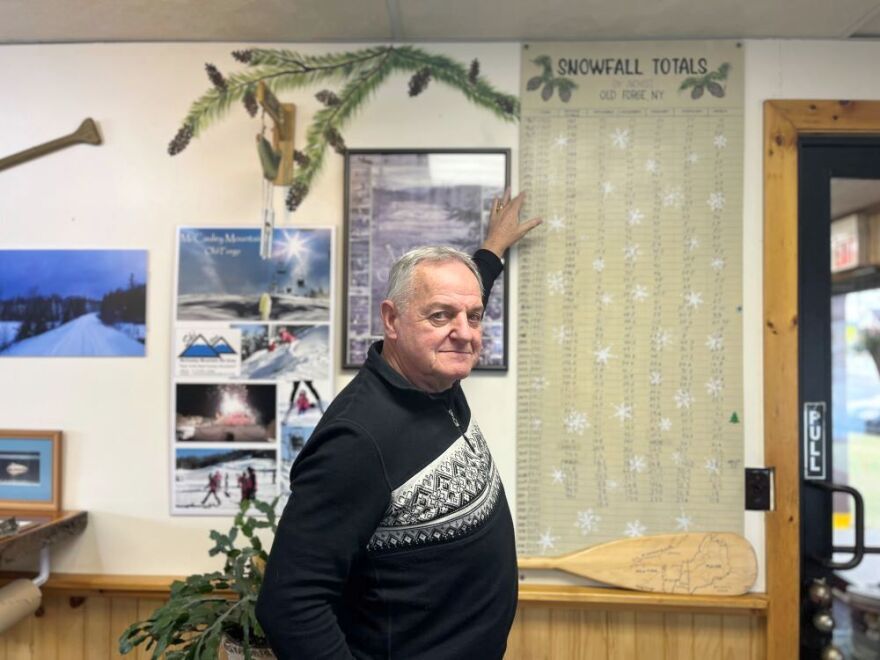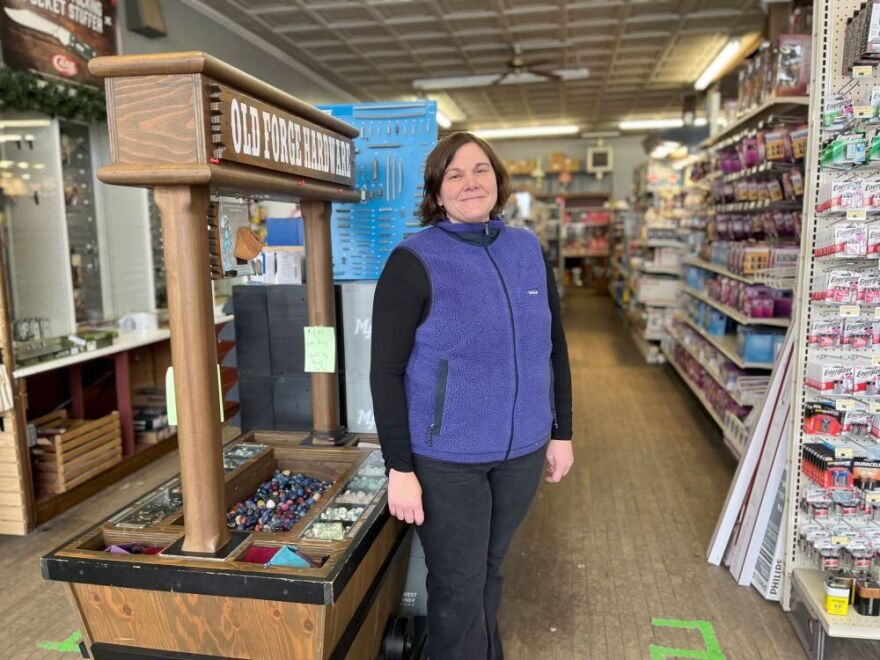Big Moose, NY is the kind of place that has one speed limit for cars and another just for snowmobiles. The tiny community in the western Adirondacks is big into snowmobiling, but it’s been pretty quiet there lately.
“We should be hearing snowmobiles, at least a couple this time of year," said Mark Mayer on a recent, unseasonably warm winter day.
Mayer owns the Big Moose Inn and loves to snowmobile. "As a matter of fact, if it were snowing, you would find me out on the trails instead of here giving an interview on how bad it is."
Climate change is resulting in warmer temperatures around the globe, particularly in the winter. In New York, late December and early January were warmer than average, with some parts of the Adirondacks experiencing recent temperatures in the 50s.

Mayer walked through wet slush last week to see one of the main snowmobile trails in Big Moose. It still had some snow, but most trails around the area have been bare recently, which is a big deal in a place that sells itself as the snowmobile capital of the east.
“Twenty, thirty years ago, you booked your reservation a year ahead and if it snowed, it was great and if it didn’t you were still here," Mayer said. "Now we’re in that cycle of, if it’s rideable we’ll come, if not we’ll chase the snow.”
Mayer estimated that he could lose up to $100,000 in a bad snow year. He usually cuts back hours and hopes to make money back in the summer if the snowmobilers don't come, but not everyone can do that.
Sara Shanahan runs the Big Moose Station, a bar and restaurant next to a trail popular with snowmobilers.

“On an average winter day, they’re probably 98% of our clientele," said Shanahan. "You’re far more likely to see sleds in the parking lot than we are to see cars in the parking lot."
Snowmobiling rose in popularity in the 1960s. The area around Big Moose and neighboring Old Forge invested heavily in the snowmobile trail system, now boasting 500 square miles of trails.
When the snowmobile trails are rideable, they're groomed almost every day by a staff of 10-12 full-time seasonal employees from the town of Webb.
But winter is changing in northern New York. It’s literally the writing on the wall inside the visitor center in nearby Old Forge. A big board lists the annual snowfall totals since the 1960s.
“Up until about 2005, we were running an average of 200 inches per year," tourism director Mike Farmer explains, pointing at the board. “Now that has dropped as you can see, but we are doing more with less than we’ve ever done before.”

With just 80 to 150 inches of snow, they groom in a way that makes less snow last longer. Farmer says snowmobilers know they can depend on more ridable trails well into late winter and early spring. “We’ve not only built our reputation on that, we’ve built our winter economy on that.”
But climate change doesn’t mean just less snow in parts of the US, it also means warmer winters.
“We’re going to have more thaws in the middle of winter and longer ones," said Curt Stager, a professor at Paul Smith's College and a leading climate scientist in the Adirondacks. "It’ll take away layers that would have otherwise built up, so we’re going see less and less reliable snowpack.”
Europe has struggled with a similar thaw in recent weeks, forcing ski resorts in the Alps to shut their doors. Some haven't even able to make snow because it’s been so warm.

Erica Murray owns a hardware and souvenir shop in Old Forge. She’s worried about what climate change could mean for her hometown.
“It’s on our minds all the time because both my husband and I, we moved back here," Murray explained. "He’s a ski coach and our kids are skiers and it’s a very huge part of why we live here— our winters.”
This area is adapting, it’s selling itself as a year-round destination for hikers, bikers and paddlers. Murray believes the Old Forge area has a lot to offer in every season. “There is a market for people to get away from it all. It is beautiful here, no matter what, with or without snow,” Murray said.
There’s still also still a lot of winter left. Shanahan from the Big Moose Station says she’s cautiously optimistic.
“Right now the forecast doesn’t look fabulous, but when it does come back, my feeling is it’ll come back with a vengeance.” Shanahan and others say they’ll be ready for when the snow does return.







